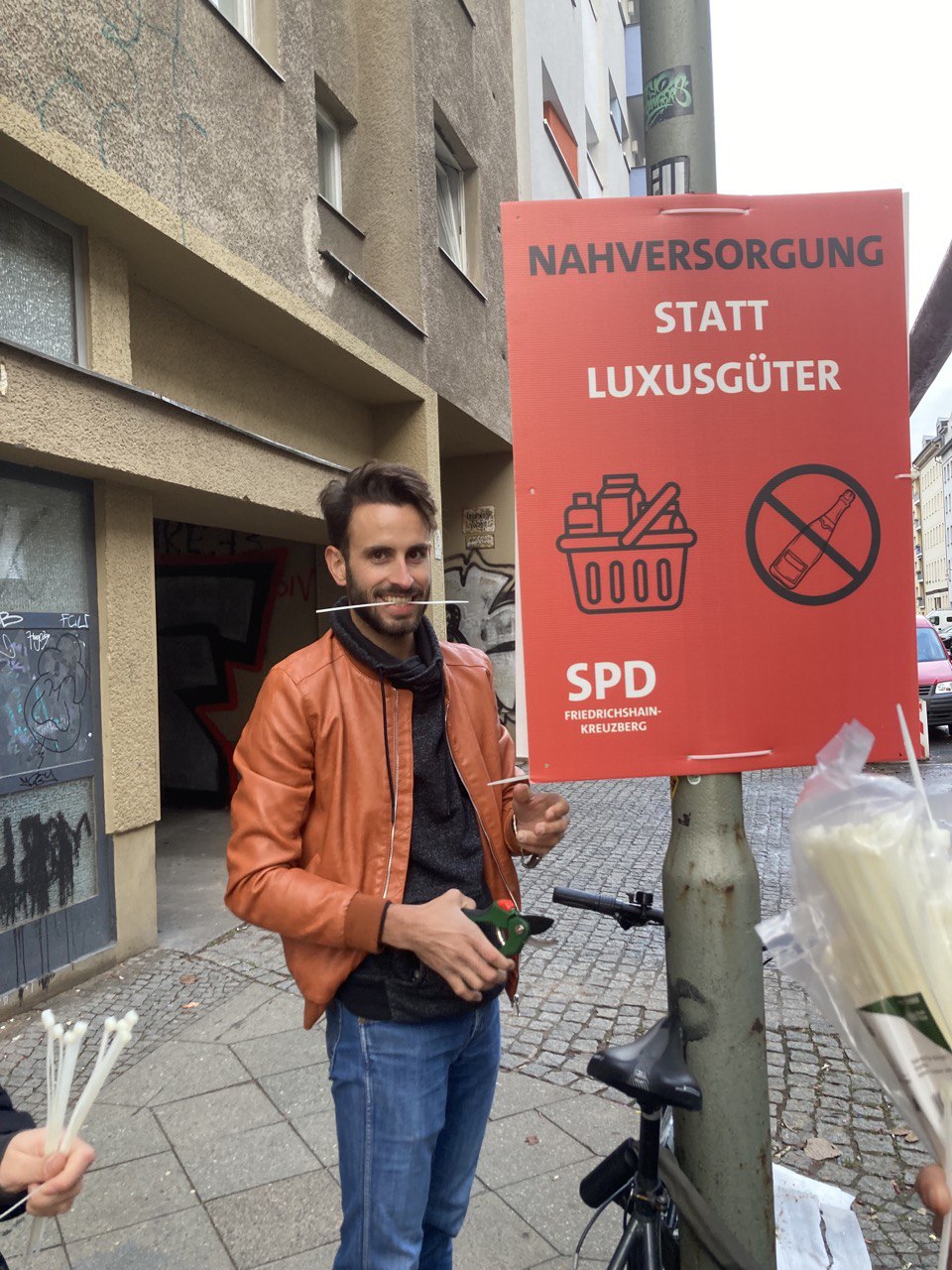Winning elections with kebabs and beer
Vincent Wolff (MPP 2015) shares how a creative poster campaign for Berlin's local elections became the success story of Germany's Social-Democratic Party (SPD).

How do you create momentum for a local election campaign when no one is particularly motivated – neither the candidates nor the voters?
This was the situation that Germany’s capital Berlin found itself in last year, following a decision by the Constitutional Court to declare the 2021 state elections invalid due to irregularities such as insufficient ballot papers, polling stations being closed, and some ballot papers delivered to the wrong districts. As a result, the Court ordered a repeat election within 90 days.
This took place on 12 February 2023 at both the local level (city council for each of the eleven districts) and the state level (for the entire state of Berlin). After decades in power, voters blamed the ruling social-democratic party (SPD) and its coalition partners, the Greens and The Left for all their ills and in the run-up to the election, forecasts looked grim.
Local election campaigns in Germany tend to be fairly mainstream: posters with profile pictures of the local candidates, party members putting information stands in pedestrian areas and small local events. Especially on a local level, German politics lacks the glamour, coolness, and emotiveness of other countries.
I was in charge of the SPD’s campaign in one of the inner districts, Friedrichshain-Kreuzberg. Being the youngest and most dense district of Berlin, Friedrichshain-Kreuzberg is known for its club scene, cultural hubs, and hipster vibes. It is also the district where the SPD used to fare worst, so we needed to break with the status quo and do something entirely new.
We developed an attention-grabbing poster campaign which we distributed across the entire district: five different posters featuring a provocative front cover and a back cover with political demands. Each poster was aimed at evoking emotions about local issues of interest. We focused on drug policy, local culture and living cost.
For example, a poster with ‘best chemistry for you” on the front showcased calls for a more liberal drug policy on the back; “beer to go for everyone” on the front of another poster featured demands for lowering living costs and maintaining local culture on the back; while another called for “kebab price brake now” on the front, with demands to tackle inflation and keep food prices down on the back. Two additional posters focused on the expansion of a premium-price shopping mall and on public safety.
Within days of the campaign launching, we made national headlines and were featured in the German version of the TV show “I'm a Celebrity”. The posters were considered “a relevant feature of contemporary politics” by a leading history museum which requested a sample. Public opinion was divided within our district, in Berlin and beyond; we heard from people wanting to buy the posters, and from others who were not amused. The SPD party executive seemed not pleased at all, while party members encouraged us. We were optimistic it would pay off on election day.
The election night turned out badly for the SPD. State-wide, the party lost around 3 percentage points, an extra hard knock after the previous elections, down to just 18.5 per cent. The SPD scored its worst result in Berlin in decades, barely holding off the Greens for second place by only 53 votes. However, as the night progressed, results from each of the eleven districts poured in. Almost all districts recorded painful losses for the SPD – with one notable exception: Friedrichshain-Kreuzberg managed to hold the previous election results, with only marginal losses. Among all the districts of Berlin, Friedrichshain-Kreuzberg emerged as some kind of winner of the night.
As we celebrated this little victory, three key take-aways emerged:
- Many voters dislike electoral campaigns and simply do not care about traditional campaign actions. To cut through the noise, you need to do something new and probably provocative.
- Creativity pays off. Not all people will like your campaign, but you only need to convince ‘new voters’ to join your camp. Attention helps your cause.
- Local issues boost local campaigns: highly localised campaigns work if voters have a strong connection to their residential area.
Bizarrely, Berlin will continue voting. In 2024, the federal elections of 2021 also need to be redone (only in Berlin) and the European elections will be held as well. In 2025, regular federal elections will take place. In 2026, the regular state and local elections will be up again. On top of that, several referendums might be held in between, with the next one only weeks away.
Berlin used to be known as the capital of techno where the party never ends. Now, it’s becoming the capital of elections where voting never seems to cease. If you’re a political animal that likes campaigning, Berlin is the place to be.
Vincent Wolff is an alumnus of the Master of Public Policy class of 2015.
